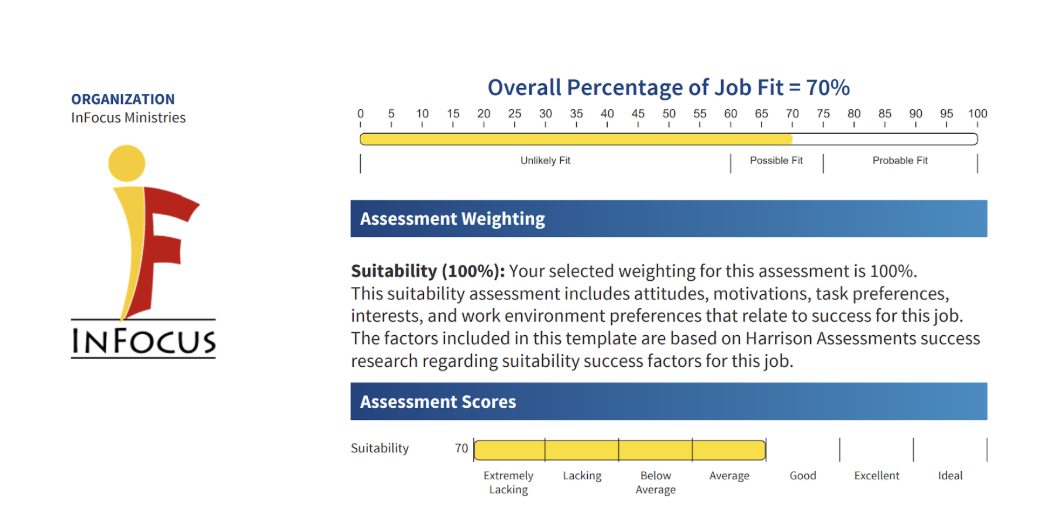Get ready for a genuinely feel-good story about self-discovery and intentional growth!
For those unfamiliar, the Harrison Assessment is a powerful tool designed to pinpoint the behavioral traits an employee enjoys and doesn’t enjoy in their specific job—it’s all about matching activities with enthusiasm. (If you want to dive deeper, you can explore the concepts further in this blog: [CLICK HERE].)
💖 From “Possible Fit” to Passionate Performance
I recently had a conversation with a wonderful new hire—let’s call her Kim—in a denominational role. Her interview process included the Harrison Assessment, and she shared a poignant, powerful story about how she leveraged the report’s insights to transform her experience. With her permission, I’m thrilled to share her journey.
When Kim took the Harrison within the last year, her initial Composite Score landed her as a “Possible Fit” with a score of 70%.
💡 Job Performance Theory suggests that when an employee enjoys 75% or more of their job, they become a “Probable Fit” and are generally three times more productive. The higher the score, the deeper the enjoyment!
A 70% fit is good, but Kim saw an opportunity to get to that “Probable Fit” level—a chance to find more joy and boost her productivity.
🎯 Identifying Key Growth Areas
The report offers a high-level view (the 30,000-foot view is seen in the image of the actual scores at the top of this blog), but its true power lies in breaking down Essential Traits. These are the key traits where high performers in that exact job (tied to Key Performance Indicators or KPIs) typically score 75% or higher.
For Kim’s position, 12 such traits were identified out of the 125 evaluated overall. The top two, listed in order of importance to the job, were Takes Initiative and Analytical.
Kim’s experience after getting the job is where the story truly shines:
“I saw the initial score, and I was motivated to increase my enjoyment in my new role. I immediately asked my supervisor, Mike, to coach me. I wanted help increasing my enjoyment in the lower traits.”
This is the relational core of the story: taking ownership and engaging a coach in her personal growth journey.
🌱 The Power of Intentional Development
Let’s look at the specific traits Kim targeted for growth:
- Takes Initiative: The tendency to perceive what’s necessary and proceed on one’s own.
- Kim’s Score: Landed on the Negative Impact side of the scale, bordering on “Slight to Moderate.” This indicated that proactively starting tasks wasn’t a natural source of enjoyment for her in this role.

- Analytical: The tendency to logically examine facts and situations (separate from analytical ability).
- Kim’s Score: Landed on the Positive Impact side, in the “Moderate” column. This was a relative strength, but it still had room to grow toward a higher level of enjoyment.
The report’s color coding helps Kim understand whether she naturally derives a positive or negative impact/enjoyment from this trait while doing the job.
🎉 Embracing the Joy of Work
After working diligently on these Essential Traits—especially “Takes Initiative”—through focused coaching and self-awareness, Kim shared her enthusiastic update:
“When I first started, I saw the opportunity to grow, and my supervisor, Mike, was so gracious and supportive in helping me! The detailed information in the Harrison report, combined with the coaching I received, motivated me to change my approach. Now I am absolutely loving my work! I truly experienced the value of this process.”
Kim’s journey is a beautiful testament to the fact that a lower assessment score isn’t a limitation—it’s a roadmap for growth. By intentionally focusing on areas where she could increase her enjoyment, she not only improved her performance but also transformed her daily experience, turning a “Possible Fit” into a genuine source of professional joy.
What part of the story resonated most with you—Kim’s response to the Harrison information, or the supervisor’s supportive coaching?

